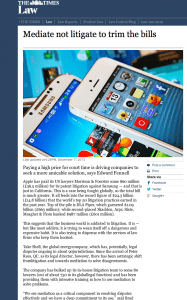This week I was quoted in a Times article about how mediation can be a much more cost effective dispute resolution process than litigation.
Mediate not litigate to trim the bills
Paying a high price for court time is driving companies to seek a more amicable solution, says Edward Fennell
Apple has paid its US lawyers Morrison & Foerster some $60 million (£36.5 million) for its patent litigation against Samsung — and that is just in California. This is a case being fought globally, so the total bill is much greater. It all feeds into the record figure of $24.3 billion (£14.8 billion) that the world’s top 50 litigation practices earned in the past year. Top of the pile is DLA Piper, which garnered $1.09 billion (£663 million); while second-placed Skadden, Arps, Slate, Meagher & Flom banked $987 million (£601 million).
This suggests that the business world is addicted to litigation. It is — but like most addicts, it is trying to wean itself off a dangerous and expensive habit. It is also trying to dispense with the services of law firms who keep them hooked.
Take Shell, the global energycompany, which has, potentially, legal disputes ongoing in about 90jurisdictions. Since the arrival of Peter Rees, QC, as its legal director, however, there has been astrategic shift fromlitigation and towards mediation to solve disagreements.
The company has bulked up its in-house litigation team to some 80 lawyers (out of about 750 in its globallegal function) and has been providing them with intensive training in how to use mediation to solve problems.
“We see mediation as a critical component in resolving disputes effectively and we have a deep commitment to its use,” said Brad Nielson, the company’s global head of litigation. For Nielson and colleagues it is no longer a matter, in most cases, of “winning” in court but instead managing the dispute to get the best business outcome. Litigation is seen as “ugly, costly, time-consuming and often ineffective. Even when you ‘win’ you often actually lose because of the damage to business relationships, reputation and management time”.
Mediation, by contrast, provides confidentiality and an opportunity to explore in depth both the strength of one’s own case and the other side’s. “By crystallising the issues and understanding the facts objectively the route forward becomes clearer,” Nielson says. In reality, most commercial disputes are settled before reaching court, but once started the litigation process may hinder an outcome. That is why many large corporations — including BP, Shell, IBM, DuPont and Pfizer — have signed up this year to the 21st Century Pledge promoted by the Centre for Effective Dispute Resolution (CEDR). “It means that if you have signed the pledge you explore mediation first,” Nielson says.
This approach is now being welcomed by the courts. In a key Court of Appeal ruling this year, Lord Justice Briggs emphasised the effectiveness of mediation. This complemented, he said, Lord Justice Jackson’s “clear endorsement of ADR [Alternative Dispute Resolution] as a process which is still insufficiently understood and still underused”. When offered the chance of mediation it should not be rejected. “In my judgment, the time has now come for this court firmly to endorse the advice given in . . . the ADR Handbook, that silence in the face of an invitation to participate in ADR is, as ageneral rule, of itself unreasonable,” said Lord Justice Briggs.
Mike McIlwrath, of GE Oil & Gas, has “no problem proposing mediation to anyone”, adding that the amount of litigation has reduced (by over 75 per cent) since the company opted to pursue mediation as its first resort.
“In terms of costs avoidance it has saved us an enormous amount of money and management time. It also has saved us some business relationships. Early resolution through mediation almost always gives a much better result than litigations. Even in personal injury cases it can save time and bring more satisfactory outcomes, McIlwrath says.
Many lawyers have now done the training provided by CEDR or another organisation accredited by the Civil Mediation Council. As property lawyer and business mediator Roger Levitt says: “When mediating I don’t give legal advice. I’m there as a facilitator to help the participants come up with a solution they can live with and own, rather than ‘win or lose’ and that can, if proceedings have been issued, be incorporated into a (Tomlin) order. Mediation is largely about putting the past behind you and focusing on what’s best going forward. It won’t necessarily give you ‘justice’ or decide who’s right and who’s wrong, but it will give you the chance to find a resolution and to move on.”
The best mediations, he stresses, are undertaken voluntarily. So while the backing of the courts is encouraging, it is important that parties mediate in the right spirit. “If you’ve a case where the two parties can’t bear to be in the same room, you can respect that and still help them find a solution by shuttling between them. As mediation is a flexible process, it helps participants find a way around the confrontational problem.”
What next? Media lawyer Paul Tweed is setting up a JAMS (formerly Judicial Arbitration and Mediation Services) mediation service in Ireland. He was onvolved, pre-Leveson, in trying to persuade Fleet Street to support mediation for the growing number of its disputes with celebrities. Now, with the press creating its own arbitration scheme, the media could well be the next area to wean itself off litigation — and those big legal bills.


